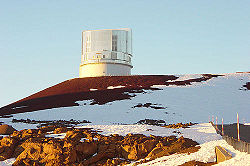National Astronomical Observatory of Japan

National Astronomical Observatory of Japan (国立天文台, kokuritsu tenmondai), also known as NAOJ,[1] is a Japanese astronomy research organization. NAOJ has several facilities in Japan; and it has an observatory on Mauna Kea in Hawaii.
History
NAOJ was established in 1988.[2] Three institutions merged. They were the
- Tokyo Astronomical Observatory of the University of Tokyo
- International Latitude Observatory of Mizusawa
- Research Institute of Atmospherics of Nagoya University.
In 2004, NAOJ became part of the National Institutes of Natural Sciences (NINS). NINS was created to promote collaboration among researchers of the five constituent institutes.[3] NAOJ merged with four other national institutes. They were
- National Institute for Basic Biology
- National Institute for Fusion Science
- National Institute for Physiological Sciences
- Institute for Molecular Science
Timeline
- 1888 Tokyo Astronomical Observatory was established by the University of Tokyo
- 1899 Latitude Observatory was established in Mizusawa.
- 1908 Astronomical Society of Japan established.
- 1949 Nobeyama University Atmospheric Research Center established
- 1960 Okayama Astrophysical Observatory established
- 1981 Hinotori satellite launched
- 1988 NAOJ established
- 1992 Nobeyama Radio Heliograph began observations
- 1996 Introduction and open use of super computers
- 1997 HALCA satellite launched
- 1999 Subaru Telescope begain working on Mauna Kea in Hawaii
- 2004 NAOJ merged into NINS
- 2006 Ishigakishima Obervatory established, Akari satellite launched
- 2007 Kaguya satellite launched
Locations
- Mitaka Campus at Mitaka, Tokyo
- The Headquarters, Astronomy Data Center, Advanced Technology Center, Public Relations Center
- Solar Flare Telescope, Sunspot Telescope, TAMA 300 gravitational wave detector
- Tokyo Photoelectric Meridian Circle
- Historical instruments: Solar Tower Telescope, 65cm refractor dome, 20cm refractor dome 35°40′31″N 139°32′17″E / 35.6752172°N 139.5380831°E
- Nobeyama Radio Observatory & Nobeyama Solar Radio Observatory at Minamimaki, Nagano
- 45m Millimeter Radio Telescope, Nobeyama Millimeter Array, Nobeyama Radio Heliograph
35°56′28″N 138°28′13″E / 35.9410112°N 138.4702528°E
- Mizusawa VERA Observatory at Ōshū, Iwate.
- 20m radio telescope, 10m VLBI radio telescope
39°08′06″N 141°08′00″E / 39.1350952°N 141.1332035°E
- Historical building: Dr. Kimura Museum
- Norikura Solar Observatory at Mount Norikura, Nagano
- 10cm Coronagraph, 25cm Coronagraph
36°07′01″N 137°33′09″E / 36.116925°N 137.552528°E
- Okayama Astrophysical Observatory at Mount Chikurinji, Okayama.
- 188cm telescope, 91cm telescope, 65cm Coude-Type solar telescope
34°34′34″N 133°35′39″E / 34.5760726°N 133.5941148°E
- VERA 20m radio telescopes
- Mizusawa
- Ogasawara. 27°05′30″N 142°13′00″E / 27.09167°N 142.21667°E
- Iriki. 31°44′52″N 130°26′24″E / 31.7478213°N 130.4399443°E
- Ishigakijima. 24°24′43.834″N 124°10′15.578″E / 24.41217611°N 124.17099389°E
- Hawaii Observatory on the island of Hawaii
- Subaru 8m telescope (Mauna Kea) 19°49′33″N 155°28′35″W / 19.825814°N 155.476455°W
- Hilo Base Facility (Hilo, Hawaii). 19°42′10″N 155°05′25″W / 19.70289°N 155.0902498°W
Projects
Gallery
National Astronomical Observatory Of Japan Media
NAOJ is involved in the construction of ALMA.
Related pages
References
- ↑ NAOJ is an English acronym. NAOJ stands for "National Astronomical Observatory of Japan".
- ↑ National Astronomical Observatory of Japan (NAOJ), History Archived 2012-06-08 at the Wayback Machine; retrieved 2012-8-12.
- ↑ National Institutes of Natural Sciences (NINS), About the NINS Archived 2012-08-18 at the Wayback Machine; retrieved 2012-8-12.
Other websites
![]() Media related to National Astronomical Observatory of Japan at Wikimedia Commons
Media related to National Astronomical Observatory of Japan at Wikimedia Commons
- National Astronomical Observatory Of Japan website Archived 2005-06-24 at the Wayback Machine






